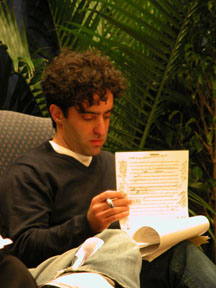 May 07
May 07
Nathan Englander's The Ministry of Special Cases: Two Reviews by Zeek
by Jay Michaelson and Peter Bebergal
p. 2 of 2

This Can't Be Real
Peter Bebergal
Latin America has produced many writers who understood reality to be malleable – subject to magical transport and fantastic puzzles containing locked boxes and mazes and labyrinths. On the other side of the world, Eastern Europe produced its own literary fabulists like Franz Kafka and Isaac Bashevis Singer. These writers also infused the real with a sense of the unreal: Kafka pinned cockroaches and nameless protagonists against apathetic and crushing administrative monoliths. Singer populated a world ravaged by antisemitism with demons and dybbuks. In The Ministry of Special Cases, the first novel by award-winning short story writer Nathan Englander, these two worlds merge in a tale about a Jewish family in 1970s Argentina. Writing about Jews living amidst a South American revolution that turns totalitarian, Englander takes his deep influences – the dread of Kafka and the lyricism of Singer – and places them in Argentina. Along the way, he conjures Jorge Luis Borges and creates something utterly real, but which one wishes was merely a dream.
Englander’s novel centers on Kaddish Poznan, his wife Lillian, and their son Pato. The family members are outcasts, even among the small population of Jews that lives in Buenos Aires. Kaddish’s mother was a prostitute, part of a group of underworld Jewish hoodlums known as the Society of the Benevolent Self – Englander's fictionalization of the Chesed Shel Emet, a mutual-aid society set up by women forced into prostitution by an Eastern European criminal gang. With names like Talmud Harry and Hezzi Two-Blades who ran a portion of the Jewish community, these men were deemed so treif that they were forced to build their own cemetery adjacent to the Jewish one – with a large fence to keep the respective dead as separate as possible.
A generation later, the only work that Kaddish is able to find – a near-blasphemous work no one else would touch – is to enter the Benevolent Self cemetery and chip names off of tombstones, the names that might link “respectable” Jews with not-so-respectable family members from their past. In one of the book’s most remarkable sections, a plastic surgeon convinces Kaddish to accept payment for his work with nose jobs for the whole Poznan family, blessed (or cursed) as they are with large noses. The surgeon, Dr. Mazursky, explains the Jewish predicament as contained in Kaddish’s nose:
‘Happiness is contained in the nose. Like a diamond, it only crystallizes under pressure. In so much space…happiness cannot form. This is why Jews, as a people, are dysthymics. In those ample noses happiness moves around like a firefly in a jar. It must be contained more exactly. One must keep it in place. Like a butterfly pinned to velvet, happiness runs through. We can cure you, Poznan. We can liberate the man trapped inside the Jew.’
Kaddish agrees, and like Dr. Mazursky believes that who we are can be chipped away like a name on a tombstone belonging to a whore or a card shark or a shady moneylender. But Jewishness is only part of what decides the fate of the Poznans. Some of it is also about being in the wrong place at the wrong time.
Pato is a university student who spends his free time listening to music on his headphones, getting stoned, and talking politics with friends. After being arrested at a concert, Pato is eventually sent home, only to be taken out of his house later that night by an anonymous group of men. Pato is “disappeared.”
 At the start of Argentina’s Dirty War, Eva Peron gave the military almost dictatorial power to rout out leftists. Eventually becoming a junta led by Jorge Rafael Videla, the dictatorship was responsible for the disappearance of over 8000 students and activists. For Englander’s Poznans, Jewishness is incidental, but however you slice it, being taken in the middle of the night remains a Jewish predicament. The Poznans are not singled out because they are Jewish, but being Jewish makes them singled out a little bit more than others. Everyone is equal in the eyes of a totalitarian government, but Jews a little less so. Even with their shorn noses, Kaddish and Lillian can’t pass for anyone other than who they are: powerless Jews in search of their missing son, one of thousands. What is a nose in the face of so much terrible anonymity?
At the start of Argentina’s Dirty War, Eva Peron gave the military almost dictatorial power to rout out leftists. Eventually becoming a junta led by Jorge Rafael Videla, the dictatorship was responsible for the disappearance of over 8000 students and activists. For Englander’s Poznans, Jewishness is incidental, but however you slice it, being taken in the middle of the night remains a Jewish predicament. The Poznans are not singled out because they are Jewish, but being Jewish makes them singled out a little bit more than others. Everyone is equal in the eyes of a totalitarian government, but Jews a little less so. Even with their shorn noses, Kaddish and Lillian can’t pass for anyone other than who they are: powerless Jews in search of their missing son, one of thousands. What is a nose in the face of so much terrible anonymity?
Englander has crafted a tale both lyrical and devastating. That such dread, despair, paranoia, and rage could be written with such poetry reveals him as a writer of considerable power. But there is resignation in the prose – in the anger and even in the tenderness that heightens the uncertainty. The influence of Kafka here is important because it’s through the individual that the larger body politic of Englander’s story is invoked. Avoiding the dangerous cliché, Englander has written an existential novel, demonstrating that there is no better way to truly understand history than through what it does to the personality of an individual.
Kaddish is a man who seems destined to fail at everything, but this is no more apparent than in his relationship with his son Pato. Before Pato is kidnapped, Kaddish becomes more and more paranoid about Pato’s safety, going so far as to burn his books in the bathtub, books that in Argentina at that time could make you “disappear.” Father and son are at each other’s throats, but this is because neither one can admit how much they need the other. Kaddish, supposedly the adult, cannot get past his own stubbornness to love at any cost. In an unbearably tense moment, the family is stopped at a roadblock when they realize Pato doesn’t have his ID:
Lillian surrendered to a fear that springs from helplessness. She’d felt it from the first glimpse of those jeeps. In Kaddish it welled up with Pato’s irresponsibility and turned right into anger, into a rage that overtakes fathers who only want to protect their sons.

The bulk of the novel involves Kaddish and Lillian’s attempts to find Pato, each in their own futile way. Kaddish is all brusque questions and tough guy tactics while Lillian spends her days drifting through administrative nightmares. And it’s here that something happens to Englander’s novel that is both unexpected and which would be wondrous if not for the way in which it demoralizes his characters. For the Poznans, the world of Argentina becomes a kind of fantasy, and Englander himself becomes its fabulist. He invokes Kafka to take a stroll around one of Borges’ fantastic libraries, but instead of lost books on mysticism, he discovers an obsession with paperwork, levels of deliberate ineptitude, and malevolent clerks that take sadistic delight in playing on the hopes and fears of those who have lost a child. While reading, the thought emerges page after page, This can’t be real, please let this not be how it really was.
But this is what it was; the disappearance of thousands of children under a paranoid and ruthless junta that pretended that there was legitimacy and logic to its tactics. And it’s this pretense that lends the novel its awful hope, a hope that drives Lillian to near-delusion in her desperate optimism. Yet her hope emerges as a buffer to Kaddish, whose whole life seems to have been about expecting the worst – and when it finally arrives – we are surprised by his ability to do more than simply rage.
This is not an easy novel, but it is an important one. Not only is it a contemporary Jewish novel that isn’t about New York or Eastern Europe, it’s also a Jewish novel that magically shows the almost surreal condition of being Jewish, where the state of being is both tragically unlike any other, but also contains the sum of all that it means to be human. Kaddish and his family are Jewish, something that is almost accidental, except when it’s not. As one minor character, another mother who has lost a child explains: “I know that when there’s death in the air, the Jew is more susceptible, more likely to catch it.”
Jay Michaelson is the chief editor of Zeek. He is the author of God in Your Body: Kabbalah, Mindfulness and Embodied Spiritual Practice.
Peter Bebergal is coauthor, with Scott Korb, of the book The Faith Between Us, forthcoming from Bloomsbury in November 2007. He publishes widely on music, literature, and religion and serves as Zeek’s Music Editor.









